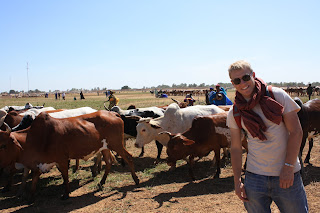
Livestock plays a central role in the Malian economy and livelihoods. It's Mali's 3rd largest export, and 80% of Malians derive some portion of their income from the raising of either of cattle or small ruminants (goat, sheep). For Mali’s nomadic Fulani people, cattle constitute more than just an asset or means of income, but is the centerpiece to their culture. Herding is not just agriculture production and trade, but paces out the seasons and sets the rhythm of daily life. In Mali, one marker of the beginning of the dry season is the herding of cattle from their domicile grazing grounds in the North in search of greener pastures south of the Niger River. Tradition has it that every year the first of these Niger River crossings takes place at Diefarabe.
This year I took a weekend trip to watch this year’s inaugural crossing, an event which seems to usually draw a decent crowd of Fulani herders and family members, Bozo fisherman/ferry-operators, Barriba villagers, local government leaders, and a handful of tourists. Here are some shots from the day.






